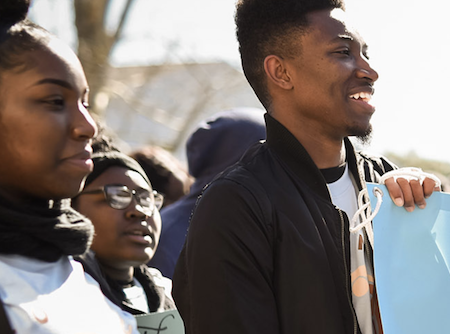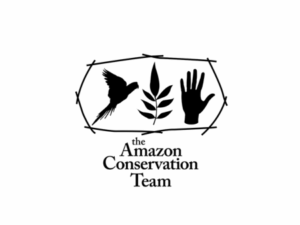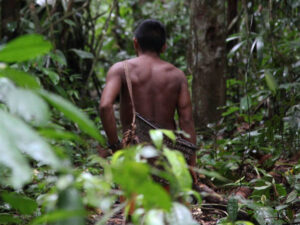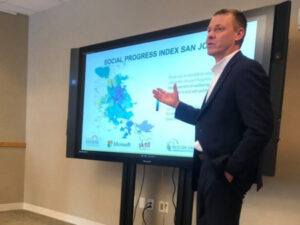The documentary Descendant follows a community in Mobile, Alabama, the last known location where enslaved people were brought to the United States. Documentarian and University of Alabama African American Studies Director Kern Jackson co-wrote and co-produced the film.
Kern Jackson spoke with Erica Edwards on April 12, 2023. Click here to read the full conversation with insights highlighted.
Erica Edwards: Could you please introduce yourself, your role in your organization, and the problem you work to address?
Kern Jackson: My name is Kern Jackson. I direct the African American Studies program at the University of South Alabama, where I’m a professor, but I’m also a filmmaker. We’re here at Skoll to show our film called Descendant. It’s a documentary that explores a community in Mobile, Alabama called Africatown, which is the site of the last known location where enslaved people were brought to the United States.
Erica Edwards: Can you tell me a little bit about how you got started on your film?
Kern Jackson: We actually did a film in 2008 called Order of Myths that looked at Carnival or Mardi Gras in Mobile, Alabama and the segregator nature of it, but also explored the festival in terms of its constituent parts of opening ceremony and parade performance and that sort of thing. It turned out that the woman who was queen of the Black Mardi Gras, her ancestors came to the United States on the Clotilda, that enslave ship, and it turned out that the queen of the white Mardi Gras had commissioned that ship. So it was sort of a confluence of the moment, and that happened during the process of making that film. We wanted to follow up on that dynamic. Unfortunately, the folks who commissioned the ship didn’t want to talk about it, so we end up exploring what the community of descendants is like and how that community of descendants is sort of representative of the rest of Black America.
Erica Edwards: What’s the impact you’re hoping this film has?
Kern Jackson: I’m hoping that the film has an impact on multiple levels. Right now it’s being shown on Netflix, so it has a wide audience, and I’m hoping that it brings a little bit more volition back to the community of 220 families that are living in Africatown now. It’s one of those towns, like many in America, where industry left and so did the bulk of the population in spite of its historic nature. And that was not only due to economics, but it had to do with the industry and the way that the industry was a poor partner in terms of toxic dumping and these types of things that co-opted people’s health.
Bringing attention to that and also to what is now sort of a flashpoint in our state of Alabama, of community advocacy. 501(c)(3)s have been developed and of course it’s baby boomers, septuagenarians and octogenarians, who want to leave a legacy of activism, bringing back a sustainable and healthy community. I’m hoping the impact of the film informs the challenge of creating new leaders or bringing new leaders to the fore, whether it’s through training or whether it’s somebody who’s unborn, who’s going to show up with some talent in 20, 30 years.
Erica Edwards: What insights or teachable lessons can be taken from your work that you feel others can use or adopt?
Kern Jackson: I feel like sometimes we have very bright, wise, resource-filled and exposed folks around who sometimes need to take that extra step and be bold and walk into the fire of whatever the situation we’re saying is advocacy. I hope that that is part of the lesson from the folks in our film and what they have to share. They truly have stepped and remained in the fire, any races and classes and environmentally-challenged environment and to do it without a lot of ego. I’m hoping that is a lesson that comes out of our film, that change can happen when people enter into the fire.
Erica Edwards: How do you measure your success and what is the evidence that you’re making progress?
Kern Jackson: In terms of a matrix of success, it always feels like it’s one step forward, two steps back, particularly on the everyday level where health concerns. Success can be measured in terms of what kind of cohort and community you can build, what kind of relationships you can develop, relationships to people who actually develop into something that’s actionable, not just theoretical. It’s measured in terms of the young people who come. When a poet shows up with a pocketful of poems and says, “I don’t do community capacity building, but I’m open to it,” and you put them to work and they stick around even though the pay sucks and there’s no real sort of monetary benefit they can get out of it. They can walk away with some values from us as elders, that I think will be important for them going forward, and hopefully they hold the breach as it were.
Erica Edwards: What problems do you address as a folklorist and a filmmaker?
Kern Jackson: As a folklorist, I let people know that there’s certain common arcs of themes and that everybody has their own sort of take and variation on a particular insight. I think that no one person has the insight. Right? Everybody has an insight. I try to create space for that to happen. My friend Anasa Troutman of The BIG We, she calls it liberative space, which I like.
Erica Edwards: How do you create space as a folklorist?
Kern Jackson: I’m into ritual. In Alabama, the whole thing about reconfiguring what’s the front porch in the summertime when you’ve had your bath and you want to sit out and you want to get your head greased because your scalp needs treatment. I think that those are times and places and for some communities, that’s where people do sacred harp singing. For some people, that’s where they talk about politics. For some people, that’s where they have prayer. And so I think replicating those types of moments on a larger scale, particularly among folks in a nonprofit who get burned out. You fight, you fight, you fight, you’re exhausted, you die. That’s not a good sustainable situation. What can we do to create ritualistic moments that enhance the work that’s being done by really bright people and keep them engaged and put them in a position to bring in others? That’s what’s in the back of my mind when I create a festival or a ritualistic moment.
In Africatown, USA, we have an under the bridge festival at the landing spot for that enslaved ship that I told you about. It’s important that we go there and that we remember and recall. So that’s an example of one. Of course, at the university we have all kinds of erudite ritualistic moments where we bring in speakers, but I don’t think it’s good just to bring in a speaker and then your job is done. I think sometimes when we have speakers, you need to create opportunities for the community or the students to be able to touch somebody. I’m going to pay somebody $25,000 to come speak, I need the people to be able to touch you, talk to you, follow up with you, not just be passive with you.
Erica Edwards: What was the turnout like at the festival?
Kern Jackson: I’d say we had about 250, 300 people come through. The festival is flanked by every industry and a train that comes periodically. It’s not a convenient spot because the neighborhood of Africatown doesn’t have access to the river, and so this is one place underneath this big expansion bridge, this landing spot, where it’s sacred space on the one hand, but it’s also flanked by heavy industry, tar sands and oil tanks and this sort of thing.
Erica Edwards: Are you working to advance system level change in your field? If so, how are you doing that?
Kern Jackson: In my field, I’m at the wind down stage, and so I think most of mine is oral. I just keep repeating things that I think are important. In this way I think of it as more of transcendence. In our advocacy, it’s resistance and persistence, but also transcendence and following the model of those survivors, so that enslave ship. And to what end? To keep in the forefront of our minds cross-generational trauma and what it does and how it’s problematic. Like I was saying with creating rituals, finding ways to process it. At a festival you do that through dancing, singing, and the verbal arts.
Erica Edwards: What do you think is needed from other partners to advance system level change?
Kern Jackson: I think more transparency and the kinds of funds people take in and use for administrative costs versus putting it towards what they actually are supposed to be doing.
Erica Edwards: How do you see your work evolving over the next five years?
Kern Jackson: I’m trying to find that next person who I can help to mentor. I’m actively looking for someone who’s going to join me in my final rounds, to be on boards and filing for grants, sharing with them the little bit that I know, and then cutting them loose to do their thing. That’s what I want to do in the next five years.
Erica Edwards: Is there anything we didn’t cover that you feel is important to add?
Kern Jackson: I think everybody here is into relationship building, which I think is really important. There’s no one way to build relationships. I like that it’s really intentional and I think there’s some honesty in that. I’m a story collector, and so I’m always interested in subsequent generations receiving skills or developing skills to tell stories.
There’s certain things, in terms of safety in our neighborhoods, that we take for granted in the US. Africatown needs these things on a base level – that’s clean air, clean water, but also street lights and sidewalks. We’re in the 21st century talking about sidewalks. So that’s what my neighbors need, some basic support and people to bring their talents to bear on this. It’s a hub of advocacy, and I think people can pitch in on everything from coming down to join one of our neighborhood cleanups to helping us develop land trust.
Erica Edwards: As far as impact, the way you collect people’s stories, how would you generally describe the impact just that alone makes? If any?
Kern Jackson: The propagation of the story is one thing, but when I do oral history, if I get your time and say with I’m collecting recipes or doing food ways and that’s my end around to studying a location as a food desert, then I’m not going to just come in there and sit at your table and drink your sweet tea and not give you anything back. I’m going to give you the interview back. I’m going to provide you access to all of my data, but I’m also going to give you an Amazon gift card and be like, “Here, this goes towards you getting your groceries.” Paying people for their time and not just taking is an important component for me.
Erica Edwards: Is there any single impact that is one that you cherish or is extremely memorable to you?
Kern Jackson: From the film, absolutely. Just to see people under 50 who have developed into community leaders, and it might be only a handful of them, but to see them kick into gear and put their boots on like Joycelyn says in the film, and get to work in really interesting, compelling ways. Everything from one young brother realizing in his small business that he needs a brick and mortar, so he’s acting on that. Another sister has gotten involved in historical tourism and she’s acting on that. I’m proud of them because they have created LLCs and they have people who are working with and for them, and I think that’s a good sort of byproduct. It’s small. It’s not nearly enough, but it’s a start.
Erica Edwards: Thank you so much for your work.
Click here to read the full conversation with insights highlighted.
Erica J. Edwards is a multimedia journalist based in NYC. She has worked at New York Public Radio, WTAE, WMUR, and the Mayor’s Office of Media and Entertainment (MOME). Edwards was a LEDE Fellow within the Solutions Journalism Network. She is deeply passionate about bringing solutions journalism to the forefront of the public’s news diet through social media.
* This interview has been edited and condensed.
Find others creating social innovation through storytelling.







